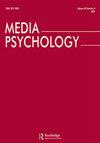Believing and Sharing False News on Social Media: The Role of News Presentation, Epistemic Motives, and Deliberative Thinking
IF 2.6
2区 心理学
Q1 COMMUNICATION
引用次数: 1
Abstract
ABSTRACT How vulnerable are we to misinformation on social media? To address this question, this study examines not only how well (or poorly) individuals discern true and false news on social media, but also how contextual factors in news presentation and individual’s cognitive and motivational tendencies might shape the patterns of their beliefs in and likelihood to engage online news. We conducted an online survey experiment on a sample of Chinese social media users recruited from a national panel (N = 481). The results show that, first, people generally perceived social media news as accurate and were better at correctly identifying truthful news than false news, revealing both a truth bias and a veracity effect. Second, social endorsement cue and news content slant could affect how individuals judge the veracity of a news post and engage it online. Third, evidence was mixed on how individuals’ deliberative thinking propensity and epistemic motive operated. While our primary goal is to present evidence from a non-Western society to shed lights on the psychology of false news on social media, we also strive toward teasing out some implications specific to the China context.在社交媒体上相信和分享虚假新闻:新闻呈现、认识动机和深思熟虑的作用
本文章由计算机程序翻译,如有差异,请以英文原文为准。
求助全文
约1分钟内获得全文
求助全文
来源期刊

Media Psychology
Multiple-
CiteScore
8.60
自引率
7.10%
发文量
30
期刊介绍:
Media Psychology is an interdisciplinary journal devoted to publishing theoretically-oriented empirical research that is at the intersection of psychology and media communication. These topics include media uses, processes, and effects. Such research is already well represented in mainstream journals in psychology and communication, but its publication is dispersed across many sources. Therefore, scholars working on common issues and problems in various disciplines often cannot fully utilize the contributions of kindred spirits in cognate disciplines.
 求助内容:
求助内容: 应助结果提醒方式:
应助结果提醒方式:


